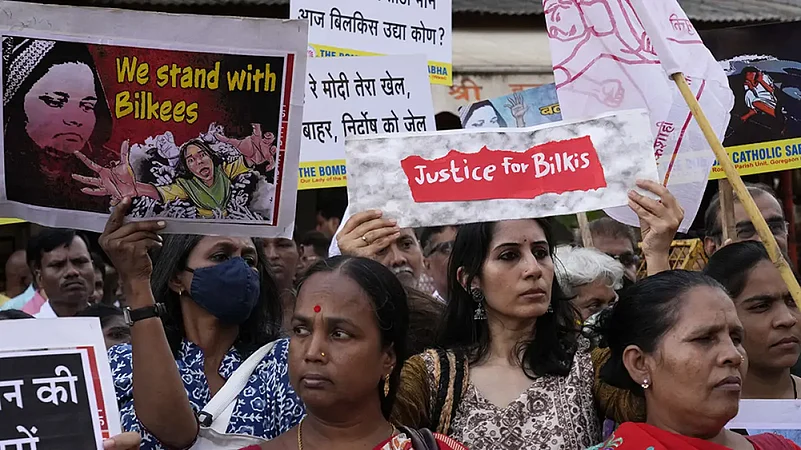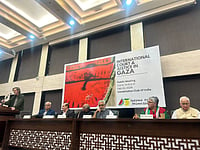Following the Supreme Court judgment quashing the earlier apex court order allowing the early release of 11 convicts in the Bilkis Bano gangrape case, the convicts will now be required to approach the Maharashtra government with the request for remission of their sentences. Pronouncing the order on Monday, January 8, a Supreme Court bench of Justices BV Nagarathna and Ujjal Bhuyan held that the convicts were wrongly granted remission by the Gujarat government in August last year. The convicts will have to surrender to the jail authorities within two weeks and undergo the remaining sentence of life term.
"The Government of the State of Gujarat had usurped the powers of the State of Maharashtra which only could have considered the applications seeking remission," the court said in its 251-page verdict.
The 11 convicts released prematurely include Bakabhai Vohania, Bipin Chandra Joshi, Kesarbhai Vohania, Govind Nai, Jaswant Nai, Mitesh Bhatt, Pradeep Mordhiya, Radheshyam Shah, Rajubhai Soni, Ramesh Chandana and Shailesh Bhatt.
The top court in its judgement said the Gujarat government had no jurisdiction to entertain the applications for remission of sentences awarded to these convicts and only the government of the state where the offenders were tried and sentenced was competent to consider such cases.
Case transfer and investigation in Maharashtra
In 2003, after Bilkis Bano, whose family was killed and she was gangraped during the 2002 Godhra riots while she was five-month pregnant, sought the Central Bureau of Investigation (CBI) probe into the matter, the case was transferred in December that year. In January 2004, CBI DSP KN Sinha took over the case from the Gujarat Police.
In August that year, the apex court transferred the trial in the case from the Gujarat High Court to the Bombay High Court and directed the Central government to appoint a special public prosecutor. In 2008, a Special Judge at Greater Mumbai convicted the 11 rapists to life imprisonment for murder and rape.
During the investigation, the CBI also filed appeals to give death sentence to three convicts and appealed against the acquittal of eight others.
Row over appeals of remission
In July 2019, Radheshyam Bhagwandas Shah, one of the prime accused in the case, filed an application before the Gujarat High Court challenging the non-consideration of his application for premature release. On July 17, the high court observed that since Shah had been tried in Maharashtra, the State of Maharashtra should be the ‘appropriate government’ to consider the remission on the ground that he had completed 15 years and four months of his life term awarded in 2008 by a CBI court in Mumbai.
On August 1, 2019, Shah had approached the then BJP-Shiv Sena coalition government in Maharastra led by former Chief Minister Devendra Fadnavis. Shah wrote to the Secretary, of the Department of Home Affairs, which was then led by Fadnavis, seeking his early release. Following this the state government sought a report from the CBI, the investigating agency in the case. All the associations collectively opposed his early release.
On August 14, 2019, in a report, the CBI court also observed that Shah “should serve his sentence fully and no leniency should be given to him” given the nature of his heinous crime. A special CBI court also gave a negative report on January 3, 2020, opposing the early release of Shah.
Meanwhile, several other convicts began to approach the superintendent of the Godhra sub-jail, who too sought the CBI court’s opinion. But in March 2022, the latter maintained that the Maharashtra government must look into the remission policy.
In May 2022, Shah filed a writ petition in the apex court challenging the Gujarat HC’s 2019 order, following which on May 13, the same year, a Bench of Justices Ajay Rastogi and Vikram Nath referred to the Gujarat government to consider Shah’s application for premature release “within a period of two months”, as per the policy that was applicable in the state on the date on which he was convicted. And on August 15, all the 11 convicts walked free from the Godhra Jail and were welcomed with garlands.
What did the Supreme Court say?
On Monday, the apex court questioned the Gujarat government over why it did not approach it against the May 13 order. The bench of Justices B V Nagarathna and Ujjal Bhuyan pointed out that when the order was referred to the Gujarat government, it had “correctly submitted…that the appropriate government in the instant case was the state of Maharashtra and not the state of Gujarat”. The SC rejected this later and on May 13, it said that the Gujarat government was indeed the appropriate government and asked it to decide the remission as per the state’s 1992 policy on remission.
The bench held the Gujarat government was liable for not filing a review petition.
Quashing the early release, the apex court also stated that it was defrauded into delivering its decision on May 13. It observed that the respondents had not divulged a series of facts which would have tilted the Supreme Court’s decision against them. The bench also pointed out in its latest judgment that Shah had failed to inform the apex court that the Gujarat High Court had dismissed his writ petition earlier.


























